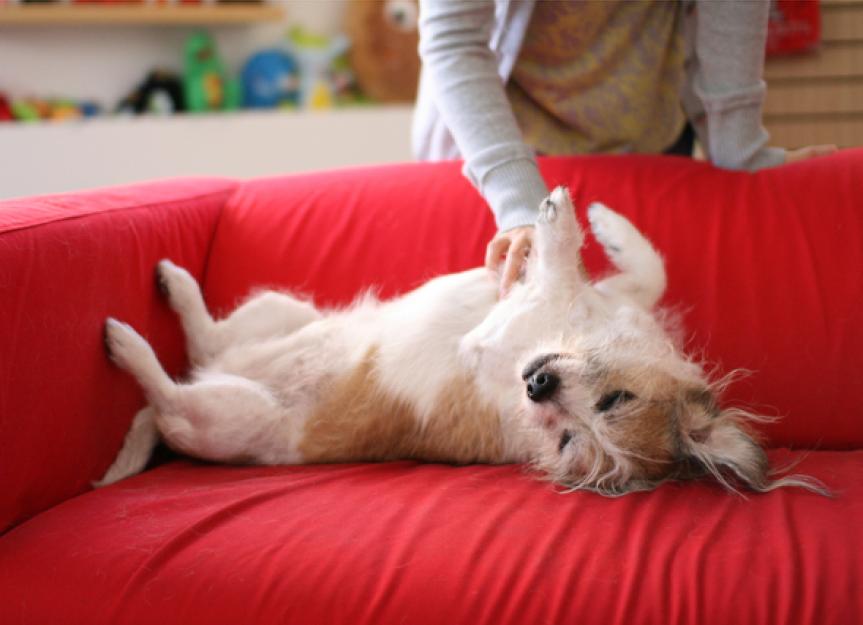Why Do Dogs Like Belly Rubs?
By Chris Illuminati
Some dogs love belly rubs almost as much as playing fetch or chewing on a really good bone, yet others could go without the show of human affection. So why do dogs like belly rubs? And is it weird if some dogs don’t?
“Belly rubbing is a comforting action,” explains Dr. Peter Brown, chief medical officer of Wagly, a veterinary-based pet service provider with campuses in California and Washington. “It’s an opportunity for bonding and part of our relationship with our dogs.”
Christine Case, an anthrozoology instructor at Beacon College in Leesburg, Florida, offers another idea about the origin of belly rubs for dogs. Case, a member of the Association of Professional Humane Educators and the International Society for Anthrozoology, feels that humans have modified canine behavior over the last thousand years due to domestication.
“Rolling on their backs is a submissive behavior that dogs exhibit toward humans.” Case explains. "I think it would be difficult to determine whether dogs truly like this activity or if they have been trained to do so. The context of the situation should be evaluated.”
Michael Schaier, a certified professional dog trainer and author of “Wag That Tail: A Trainer’s Guide To A Happy Dog,” concurs with Case’s assessment, but adds that affection is one of the greatest training tools a human can use on a canine.
"A dog rolling on his back is a submissive action and puts the canine in a vulnerable position," says Schaier, “but dogs have been bred for 10,000 years to be social animals and coexist with humans.”
Studying Back Rolling Behavior in Dogs
A dog rolling over on his back doesn’t always mean the animal is being playful, submissive, or looking for a belly rub, especially in instances when other dogs are close by. In 2015, two teams of researchers from the University of Lethbridge in Alberta and the University of South Africa set out toinvestigate the meaning and functionof dogs rolling over during play with other dogs. The researchers wanted to know if a dog rolling over onto the back is really an act of submission that serves to stop aggression or a tactic executed for combat purposes.
The researchers examined videos showing dogs playing together and staged play sessions with a medium-sized female dog paired with 33 dogs of different breeds and sizes. Then, they sat back and observed.
The researchers concluded that while dogs may roll when playing, the move might also be used to gain an advantage in fighting. Of rollovers observed, none of the dogs rolled over in a submissive response to aggressive behavior by another dog. Researchers noted that dogs rolling on their backs in front of other dogs used their position to block playful bites and launch attacks on the aggressor.
Should You Rub Your Dog’s Belly?
If pets are comfortable with belly rubs, pet owners should feel free to pet away. But Brown warns that a dog who suddenly doesn’t enjoy a good tummy scratching might be conveying a different message. “If your dog normally likes belly rubs, and then stops, that can be a sign of a sore belly or possibly an issue where their back is causing pain.”
There are, however, some dogs who can survive without the constant stomach rubbing.
“Past experience could affect the dog’s like or dislike for the activity,” Case remarks. “If a dog does not like to have its belly rubbed, it does not mean there is anything wrong—perhaps it’s just [the dog’s] preference. It’s up to the individual animal”
But most experts agree that when dogs ask for belly rubs or petting of any kind, it shows how comfortable they feel as part of the family.
“The greatest reward you can give your dog,” adds Schaier, “is the touch of your hand.”
Help us make PetMD better
Was this article helpful?
